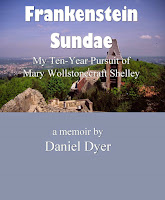Last time I
mentioned that I thought I had a first edition of London’s The Scarlet Plague (I could see
the damn thing!), but repeated searches of the same place (a bookcase where I
keep all my London books) turned up the same result each time (imagine?!):
nada.
But this
morning … I found my copy. Which is not
a first edition but is part of what’s called the “Sonoma Edition” of London’s
works—reprints issued by Macmillan (London’s publisher throughout his career,
with a few exceptions) in the 1920s following his death in 1916. My copy of Plague is odd because the volume
contains two of London’s shorter novels—Plague
and The Call of the Wild. Both, of
course, show what happens when the world radically changes—for a dog (Wild), for humans (Plague).
As I also
wrote, I read Plague in November
1986, near the beginning of my London mania. (Was I reading it on my forty-second
birthday, November 11? I was not keeping a regular journal at the time, so I
don’t know.)
Anyway, for
your edification (?), here is my 1986 summary of that book (I’ve made no
changes):
Futuristic, short novel in which a great plague, in
2013, destroys nearly all of humankind. Sixty years later the story begins as 3
savage boys (Edwin, Hoo Hoo, and Hare-Lip) accompany an old man they now call
“Granser,” who once had been Professor James Howard Smith, prof. of Eng. Lit.
at Berkeley.
The boys,
who frequently taunt Granser & show him little respect and who speak like
savages & have no learning at all (“What’s education?” one asks; “What’s
money?” from another), convince Granser to tell them the story of the Plague—which
he does, consuming most of the rest of the book.
The Scarlet
Plague, caused by micro-organisms, killed quickly (15 min–2 hours), symptoms
being the scarlet color and progressive numbness from the toes to heart.
Millions died all over the world, and the world quickly became brutal &
wild as groups called Prowlers (from the slums) shot, plundered, & burned.
Granser was
immune & wanders for years alone before he encounters a brute, Bill the
Chauffeur, who is keeping & terrorizing Vesta Van Warden, the billionaire’s
wife Bill had once worked for. Granser can’t defeat him, so he leaves & discovers
other survivors near: Glen Ellen!—joins them, sires children, etc. Keeps books
in dry cave in case they’re needed—Edwin, perhaps, the most gentle may one day
want them.
Some things
to note here. London himself had attended Berkeley for a year (before dropping
out and heading off on the gold rush). London—like many other writers and
thinkers and thoughtful people of all sorts—knew that ignorance and poverty were
the great threats to civilization. London’s own ranch was in Glen Ellen, a tiny
community north of San Francisco in the Sonoma Valley.
 |
| The Somoa Edition I DO have. |
Next time--some similarities to Mary Shelley's The Last Man (1826) ...
 |
| The 1st edition I DON'T have |


No comments:
Post a Comment